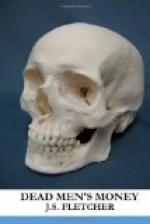“I mean to say they positively are not, sir,” replied the butler. “They were kept in a certain safe in a small room used by Lady Carstairs as her boudoir. Her ladyship left very hastily and secretly yesterday, as I understand the police have told you, and, in her haste, she forgot to lock up that safe—which she had no doubt unlocked before her departure. That safe, sir, is empty—of those things, at any rate.”
“God bless my soul!” exclaimed Mr. Portlethorpe, greatly agitated. “This is really terrible!”
“Could she carry those things—all of them—on her bicycle—by which I hear she left?” asked Mr. Lindsey.
“Easily, sir,” replied Hollins. “She had a small luggage-carrier on her bicycle—it would hold all those things. They were not bulky, of course.”
“You’ve no idea where she went on that bicycle?” inquired Mr. Lindsey.
Hollins smiled cunningly, and drew his chair a little nearer to us.
“I hadn’t—when I went to Mr. Murray, at the police-station, this morning,” he answered. “But—I’ve an idea, now. That’s precisely why I came in to see you, Mr. Lindsey.”
He put his hand inside his overcoat and produced a pocket-book, from which he presently drew out a scrap of paper.
“After I’d seen Mr. Murray this morning,” he continued, “I went back to Hathercleugh, and took it upon myself to have a look round. I didn’t find anything of a remarkably suspicious nature until this afternoon, pretty late, when I made the discovery about the safe in the boudoir—that all the articles I’d mentioned had disappeared. Then I began to examine a waste-paper basket in the boudoir—I’d personally seen Lady Carstairs tear up some letters which she received yesterday morning by the first post, and throw the scraps into that basket, which hadn’t been emptied since. And I found this, gentlemen—and you can, perhaps, draw some conclusion from it—I’ve had no difficulty in drawing one myself.”
He laid on the table a torn scrap of paper, over which all three of us at once bent. There was no more on it than the terminations of lines—but the wording was certainly suggestive:—
“.... at once, quietly .... best time would be before lunch .... at Kelso .... usual place in Glasgow.”
Mr. Portlethorpe started at sight of the handwriting.
“That’s Sir Gilbert’s!” he exclaimed. “No doubt of that. What are we to understand by it, Lindsey?”
“What do you make of this?” asked Mr. Lindsey, turning to Hollins. “You say you’ve drawn a deduction?”
“I make this out, sir,” answered the butler, quietly. “Yesterday morning there were only four letters for Lady Carstairs. Two were from London—in the handwriting of ladies. One was a tradesman’s letter—from Newcastle. The fourth was in a registered envelope—and the address was typewritten—and the post-mark Edinburgh. I’m convinced, Mr. Lindsey, that the registered one contained—that!




